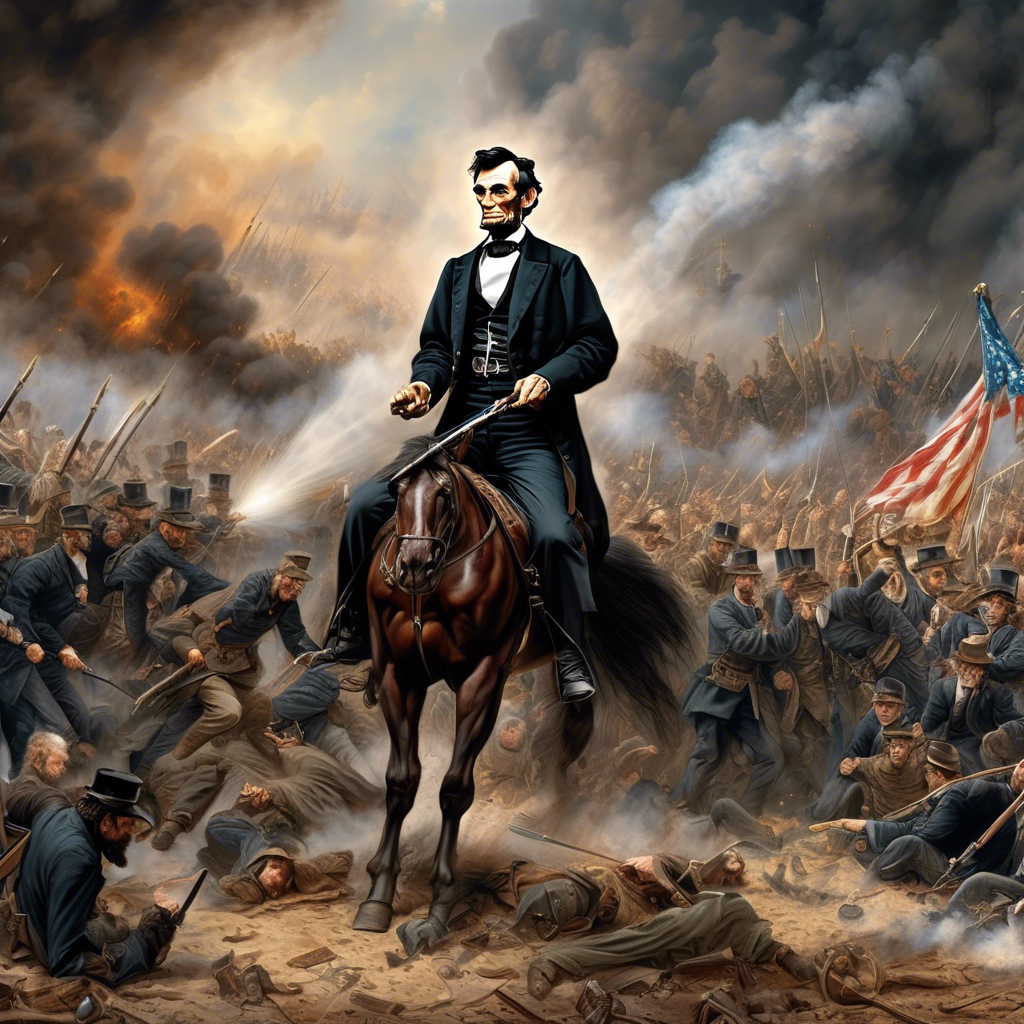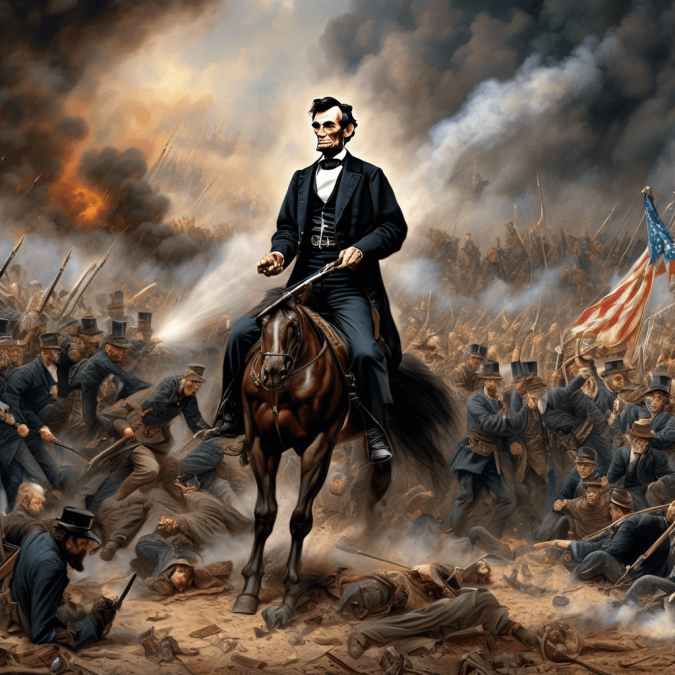
1. Introduction
Abraham Lincoln, the 16th President of the United States, holds a significant place in American history as a visionary leader during a tumultuous period. His steadfast leadership during the Civil War and his commitment to preserving the Union have made him a revered figure in the annals of American politics. This documentation aims to explore the life, career, and legacy of Abraham Lincoln, shedding light on his enduring impact on American society.
Brief Overview of Abraham Lincoln’s Significance in American History
Abraham Lincoln rose from humble beginnings to become one of the most revered presidents in American history. His unwavering dedication to the principles of liberty, equality, and democracy shaped the course of the nation during a critical juncture. Lincoln’s leadership during the Civil War and his efforts to abolish slavery have cemented his legacy as a champion of freedom and unity.
Purpose of the Documentation
The purpose of this documentation is to provide a comprehensive overview of Abraham Lincoln’s life, from his early years to his presidency and beyond. By delving into his family background, early career, political journey, presidency, and legacy, this article seeks to illuminate the key moments and decisions that defined Lincoln’s legacy and continue to inspire generations of Americans.
2. Family Background
Early Life and Upbringing
Abraham Lincoln was born on February 12, 1809, in a log cabin in Hardin County, Kentucky. His childhood was marked by poverty and hardship, as his family moved frequently in search of better opportunities. Despite these challenges, Lincoln’s early experiences instilled in him a strong work ethic and a deep sense of empathy for the less fortunate.
Parents and Siblings
Lincoln’s parents, Thomas and Nancy Hanks Lincoln, were farmers of modest means who instilled in him the values of honesty, integrity, and self-reliance. Lincoln’s mother died when he was just nine years old, leaving a profound impact on his upbringing. He had an older sister, Sarah, and a younger brother, Thomas, with whom he shared a close bond.
Childhood Experiences and Education
Lincoln’s formal education was limited to a few years of schooling in a one-room log cabin schoolhouse. However, his thirst for knowledge and love of reading led him to educate himself through books, newspapers, and interactions with knowledgeable individuals in his community. Lincoln’s early experiences of poverty and hardship shaped his compassionate outlook on life and his commitment to social justice.
3. Early Career
Entry into Politics
Lincoln’s entry into politics began in the Illinois State Legislature, where he served as a Whig representative. His eloquence, wit, and strong moral convictions quickly set him apart as a rising star in Illinois politics. Lincoln’s advocacy for infrastructure projects, education reform, and economic development endeared him to the people of Illinois and laid the foundation for his future political career.
Legal Career
Before entering politics, Lincoln pursued a career as a self-taught lawyer, gaining admission to the Illinois bar in 1836. His keen legal mind, integrity, and dedication to justice earned him a reputation as a skilled and honorable attorney. Lincoln’s legal career provided him with valuable insights into the workings of the legal system and prepared him for the challenges of public service.
Marriage and Family Life
In 1842, Lincoln married Mary Todd, a well-educated and spirited woman from a prominent Kentucky family. The couple had four sons together, although tragedy struck with the deaths of two of their children at young ages. Despite personal hardships, Lincoln’s devotion to his family remained steadfast, and his role as a loving husband and father was a source of strength throughout his political career.
4. Political Journey
Member of the Illinois State Legislature
Lincoln’s early political career in the Illinois State Legislature laid the groundwork for his future ambitions. His advocacy for internal improvements, education, and economic development endeared him to his constituents and established him as a rising political star in Illinois. Lincoln’s commitment to public service and his dedication to the common good guided his actions as a state legislator.
U.S. House of Representatives
In 1847, Lincoln was elected to the U.S. House of Representatives, where he served a single term representing Illinois. His opposition to the Mexican-American War and his advocacy for the abolition of slavery in the District of Columbia showcased his moral courage and political acumen. Despite the challenges of a divided Congress, Lincoln’s principled stance on key issues set him apart as a leader of integrity and vision.
Presidential Campaigns and Election as the 16th President of the United States
Lincoln’s rise to the presidency was marked by his stirring debates with Stephen Douglas and his unwavering commitment to preserving the Union. In 1860, Lincoln secured the Republican nomination for president and went on to win a decisive victory in the electoral college. His election as the 16th President of the United States marked a pivotal moment in American history, setting the stage for the tumultuous years ahead.
5. Presidency
Major Policies and Decisions
As president, Lincoln faced the daunting task of leading a nation torn apart by civil war. His major policies, including the Emancipation Proclamation, the Homestead Act, and the establishment of the National Banking System, reflected his commitment to freedom, equality, and economic progress. Lincoln’s leadership during this turbulent period set a high standard for moral courage and political resolve.
Leadership During the Civil War
Lincoln’s leadership during the Civil War was marked by his ability to inspire and unite a divided nation. His steady hand and strategic vision guided the Union forces to victory, despite significant challenges and setbacks. Lincoln’s decision-making during this period showcased his wisdom, compassion, and determination to preserve the Union at all costs.
Emancipation Proclamation and the Abolition of Slavery
One of Lincoln’s most enduring legacies was his issuance of the Emancipation Proclamation in 1863, which declared all slaves in Confederate-held territory to be free. This landmark decision marked a turning point in the war and set the stage for the eventual abolition of slavery in the United States. Lincoln’s unwavering commitment to justice and equality in the face of fierce opposition solidified his place as a champion of freedom and human rights.
6. Legacy
Impact on American Society and Politics
Abraham Lincoln’s impact on American society and politics is immeasurable. His leadership during the Civil War and his efforts to abolish slavery transformed the nation and set a new course for its future. Lincoln’s legacy as a unifier, emancipator, and visionary leader continues to inspire generations of Americans to strive for a more perfect union.
Assassination and Funeral
Tragically, Lincoln’s life was cut short by an assassin’s bullet on April 14, 1865, just days after the end of the Civil War. His assassination sent shockwaves through the nation and plunged the country into mourning. Lincoln’s funeral procession, which traveled from Washington, D.C., to Springfield, Illinois, was attended by thousands of grieving citizens who paid their respects to the fallen president.
Memorials and Remembrances
In the years following his death, Abraham Lincoln has been honored with numerous memorials, statues, and monuments across the country. The Lincoln Memorial in Washington, D.C., stands as a testament to his enduring legacy and his contributions to American history. Lincoln’s image and words continue to inspire people around the world to strive for a more just and equitable society.
7. Conclusion
Summary of Abraham Lincoln’s Life and Contributions
Abraham Lincoln’s life was marked by courage, compassion, and unwavering dedication to the principles of freedom and equality. From his humble beginnings to his presidency and beyond, Lincoln’s legacy as a visionary leader and emancipator has left an indelible mark on American history. His enduring contributions continue to inspire people of all backgrounds to work towards a more just and inclusive society.
Personal Reflections on His Enduring Legacy
As we reflect on the life and legacy of Abraham Lincoln, we are reminded of the power of leadership, integrity, and moral courage. Lincoln’s ability to navigate the challenges of his time with grace and determination serves as a timeless example of what it means to lead with compassion and conviction. His enduring legacy reminds us that even in the face of adversity, one person’s actions can make a profound impact on the course of history.
8. References
– Goodwin, Doris Kearns. “Team of Rivals: The Political Genius of Abraham Lincoln.” Simon & Schuster, 2005.
– McPherson, James M. “Tried by War: Abraham Lincoln as Commander in Chief.” Penguin Books, 2008.
– White, Ronald C. “A. Lincoln: A Biography.” Random House, 2009.
– Abraham Lincoln Online. www.abrahamlincolnonline.org
– The Library of Congress. www.loc.gov
In conclusion, Abraham Lincoln’s legacy as a visionary leader, emancipator, and unifier continues to resonate with people around the world. His steadfast commitment to justice, equality, and freedom remains a guiding light for those who seek to create a more just and equitable society. As we reflect on Lincoln’s life and contributions, we are reminded of the power of leadership, integrity, and moral courage to shape the course of history and inspire generations to come. Abraham Lincoln truly stands as a beacon of hope and inspiration in the annals of American history.
